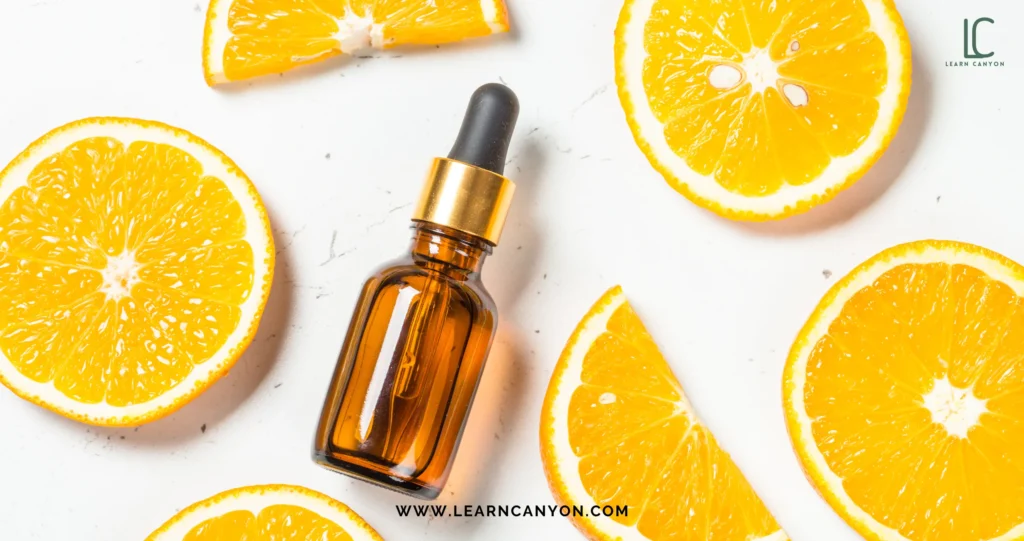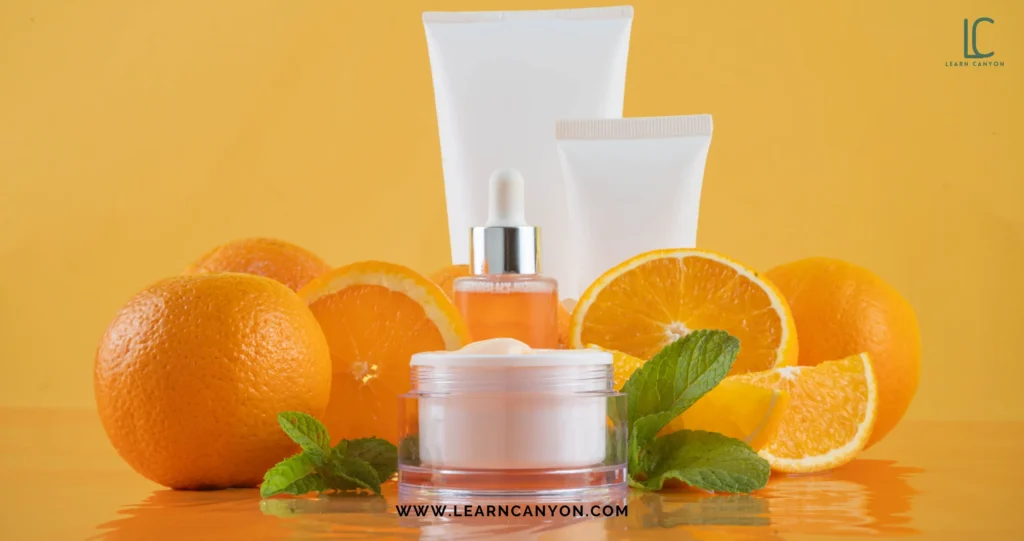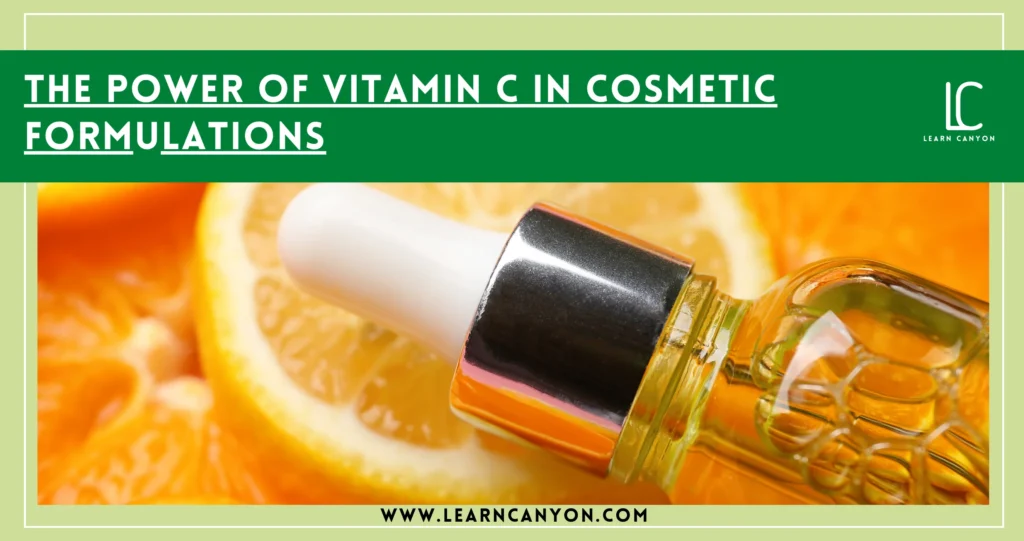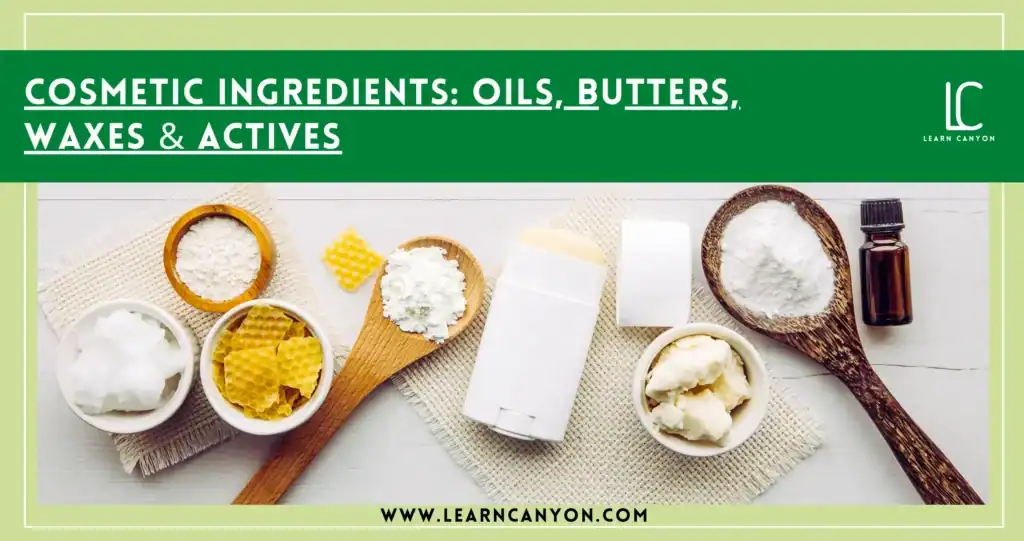Have you ever wondered why Vitamin C is such a buzzword in the world of skincare? It’s one of those ingredients that seems to pop up everywhere from serums and creams to toners and even face masks.
But what makes this powerhouse so special?
Let’s take a little trip back in time. Vitamin C first gained attention in the health world for its role in preventing scurvy. Fast forward to today, and it’s a staple in modern skincare routines and for a good reason. Known as ascorbic acid in its pure form, Vitamin C is a natural antioxidant that works wonders for your skin. Think of it as your skin’s personal bodyguard, fighting off damage from the sun, pollution, and even stress.
But here’s the catch: our bodies don’t produce Vitamin C naturally, and getting enough through diet doesn’t always guarantee your skin will reap the benefits. That’s where topical application comes into play. Skincare products with Vitamin C are like a direct dose of radiance, delivering this multitasking nutrient right where your skin needs it most.
Over the years, cosmetic chemists have found innovative ways to stabilize this delicate ingredient, making it even more effective and accessible for all skin types. So whether you’re looking to brighten your complexion, smooth out fine lines, or boost your skin’s natural glow, Vitamin C might just be your new best friend.
Understanding Vitamin C:
Let’s talk science for a moment don’t worry, we’ll keep it fun! Vitamin C, also known as ascorbic acid, is one of the most researched and loved ingredients in skincare. But what makes it so special, and why does it seem to be in every “must-have” product on the market?
At its core, Vitamin C is an antioxidant.
Imagine your skin is like a shiny apple. Over time, exposure to sunlight, pollution, and even stress can make that apple oxidize and turn brown (aka dull and damaged skin). Antioxidants, like Vitamin C, swoop in to slow down this oxidation process, keeping your skin fresh, bright, and healthy.
But there’s a little more to the story. The Vitamin C you find in skincare isn’t always the same as what’s in your orange juice. The purest and most potent form is L-Ascorbic Acid, but it’s also a bit high-maintenance. It’s sensitive to light, heat, and air—basically, it needs some serious TLC to stay effective. That’s why you’ll often see it packaged in dark, airtight bottles.
And here’s where things get interesting. Because of its finicky nature, cosmetic chemists have developed several stable derivatives of Vitamin C, like Sodium Ascorbyl Phosphate and Magnesium Ascorbyl Phosphate. These forms are less prone to breaking down and can still deliver amazing results perfect for those who want all the benefits with less hassle.
Vitamin C works best in an acidic environment (around a pH of 3.5), which helps it penetrate the skin effectively. This is why it’s so often paired with ingredients like Vitamin E or Ferulic Acid to enhance its stability and boost its performance.
Benefits of Vitamin C for the Skin
Well, this superstar ingredient doesn’t just do one thing. It’s like the overachiever in skincare routine, tackling multiple concerns all at once. Let’s break it down:
1. It’s the ultimate glow booster
Ever wonder why some people have that fresh, lit-from-within glow? Chances are, Vitamin C is playing a big role. This ingredient brightens your skin by targeting dark spots and uneven tone, giving you that radiant, Instagram-worthy complexion.
2. It’s a shield against daily damage
Think of Vitamin C as your skin’s bodyguard. Every day, your skin battles pollution, UV rays, and other environmental aggressors that cause damage over time. Vitamin C, being a powerful antioxidant, neutralizes those nasty free radicals before they can wreak havoc.
3. It’s your collagen cheerleader
As we age, our skin’s collagen production slows down (cue the fine lines and sagging). Vitamin C steps in to stimulate collagen synthesis, helping your skin stay firm, plump, and youthful. It’s like hitting the rewind button for your skin.
4. It’s got your back against UV damage
No, it’s not a replacement for sunscreen, but Vitamin C does work beautifully alongside SPF. It helps reduce the effects of UV exposure, like sunspots and redness, making your sunscreen even more effective.
5. It calms and heals
Got redness or inflammation? Vitamin C has soothing properties that can help calm irritated skin and even speed up the healing process. It’s especially great for those with acne scars or post-inflammatory hyperpigmentation.
6. It’s for everyone
The best part? Vitamin C is suitable for almost all skin types. Whether you’re dealing with dryness, oiliness, or sensitivity, there’s a formulation of Vitamin C out there for you.

Types of Products with Vitamin C
Let’s talk about the many ways you can get your dose of Vitamin C. This powerhouse ingredient has found its way into all kinds of skincare products, so no matter your routine, there’s a Vitamin C option to fit in perfectly. Let’s explore!
1. Serums:
If you’re serious about glowing skin, a Vitamin C serum is a must-have. Why? Serums are lightweight, fast-absorbing, and packed with high concentrations of Vitamin C, delivering maximum benefits right where your skin needs it. Use it right after cleansing for that immediate glow-up.
2. Creams and Moisturizers:
Don’t have time for multiple steps in your routine? No worries! Vitamin C-infused moisturizers combine hydration with brightening and anti-aging benefits. They’re perfect for locking in moisture while giving your skin a boost of antioxidants throughout the day.
3. Toners and Essences:
Want a quick, refreshing way to add Vitamin C to your routine? Toners and essences with Vitamin C prep your skin for the rest of your routine while delivering a gentle dose of brightening goodness. They’re especially great for those who love lightweight formulas.
4. Face Masks and Peels:
Need a pick-me-up before a big event? Vitamin C face masks and peels are like a shot of espresso for your skin. They instantly brighten, refresh, and leave your face looking radiant. Plus, they’re a treat for those self-care nights!
5. Cleansers:
Yes, even your cleanser can have Vitamin C! While it won’t stay on your skin long enough for major results, a Vitamin C cleanser is a great way to kick off your routine with a gentle dose of antioxidants.
6. Sunscreens:
Some sunscreens are now infused with Vitamin C to provide an extra layer of defense against environmental damage. Think of it as combining protection with prevention—your skin will thank you.
7. Eye Creams:
Tired eyes? Vitamin C eye creams can help lighten dark circles and reduce puffiness, giving your under-eye area a brighter, more awake look.
Formulating with Vitamin C: Challenges and Solutions
Vitamin C is like the diva of the skincare world, powerful and effective, but a little high-maintenance. As incredible as it is, working with Vitamin C in formulations comes with its fair share of challenges. But don’t worry, for every problem, there’s a smart solution.
Let’s dive into the core of creating products with this ingredient!
Challenge 1: Stability Issues
Vitamin C, especially in its pure form (L-Ascorbic Acid), is notoriously unstable. It doesn’t play well with light, air, or heat, which means it can oxidize and lose its effectiveness faster than you’d like.
Solution:
To keep Vitamin C stable, formulations often:
- Use airless pumps or opaque packaging to protect it from light and air.
- Combine it with stabilizers like Vitamin E and Ferulic Acid, which also enhance its performance.
- Opt for stable derivatives like Sodium Ascorbyl Phosphate or Magnesium Ascorbyl Phosphate, which are less prone to oxidation.
Challenge 2: pH Sensitivity
Vitamin C works best in an acidic environment, typically at a pH of 3.5 or lower. If the pH isn’t right, it won’t penetrate the skin properly, and you won’t get the desired results.
Solution:
Carefully balance the pH during formulation. Adding gentle acids or buffers can help achieve the right pH without irritating the skin. Regular testing throughout the process ensures everything stays on track.
Challenge 3: Skin Irritation
Highly concentrated Vitamin C products can sometimes cause redness or tingling, especially for sensitive skin types.
Solution:
- Use lower concentrations (around 5–10%) for sensitive skin or beginners.
- Incorporate derivatives like Tetrahexyldecyl Ascorbate, which are milder but still effective.
- Pair Vitamin C with soothing ingredients like Aloe Vera or Oat Beta-Glucan to calm the skin.
Challenge 4: Compatibility with Other Ingredients
Vitamin C doesn’t always get along with certain actives, like Niacinamide or AHAs, in the same formulation. These interactions can affect stability or cause irritation.
Solution:
- Formulate complementary products instead of combining them in one formula. For example, use Vitamin C in your morning routine and Niacinamide in the evening.
- If combining, ensure careful pH balancing and test compatibility during the formulation phase.
Challenge 5: Oxidation Over Time
Even the most carefully formulated Vitamin C product will eventually oxidize, turning yellow or brown. This reduces its effectiveness and can even irritate the skin.
Solution:
- Keep batches small and fresh during production.
- Use antioxidants like Ferulic Acid to slow down oxidation.
- Advise users to store products in a cool, dark place and finish them within the recommended time.
Challenge 6: Cost of High-Quality Ingredients
Pure Vitamin C and its derivatives can be expensive, especially if you’re sourcing high-quality materials for a professional-grade product.
Solution:
- Consider formulating with derivatives for better cost-efficiency.
- Use blends of Vitamin C with other brightening agents (like Licorice Extract or Alpha Arbutin) to achieve similar results without relying on high concentrations of Vitamin C alone.
Formulating with Vitamin C is all about understanding its quirks and working with, rather than against, its limitations.
With the right strategies, you can create stable, effective, and skin-loving Vitamin C products that deliver all the glow without the hassle.

Using Vitamin C in Combination with Other Ingredients
Vitamin C might be a superstar on its own, but like any great performer, it shines even brighter when paired with the right co-stars. Combining Vitamin C with other ingredients can amplify its benefits, target multiple skin concerns, and create a more well-rounded skincare experience. But, as with any collaboration, you need to make sure everyone gets along. Let’s explore some of Vitamin C’s best (and not-so-great) partners in skincare!
1. Vitamin E:
Vitamin C and Vitamin E are like peanut butter and jelly—they’re amazing together. While Vitamin C neutralizes free radicals, Vitamin E helps stabilize it and provides additional antioxidant protection. This duo is often found in serums and works wonders for brightening and anti-aging.
Why it works:
They’re both fat-soluble, so they penetrate deeply, protecting your skin from oxidative stress and UV damage.
2. Ferulic Acid:
When you add Ferulic Acid to the Vitamin C + Vitamin E mix, magic happens. Ferulic Acid enhances the stability of Vitamin C and E while boosting their effectiveness. Together, they create a powerhouse cocktail that brightens, firms, and protects the skin.
Why it works:
Ferulic Acid is a natural antioxidant that complements Vitamin C’s brightening and anti-aging properties.
3. Hyaluronic Acid:
Vitamin C can sometimes be drying, especially in higher concentrations. Enter Hyaluronic Acid—a hydrating ingredient that replenishes moisture and keeps your skin plump and dewy.
Why it works:
Hyaluronic Acid pairs beautifully with Vitamin C, ensuring your skin stays hydrated and balanced while soaking up all the brightening benefits.
4. Sunscreen:
Here’s a pro tip: always layer your Vitamin C under sunscreen during the day. While Vitamin C doesn’t replace sunscreen, it boosts your SPF’s ability to protect against UV rays and helps prevent sun damage, like dark spots and wrinkles.
Why it works:
Vitamin C neutralizes free radicals caused by sun exposure, while sunscreen blocks harmful rays. It’s a match made in skincare heaven.
5. Niacinamide:
This is where things get interesting. Some people say Vitamin C and Niacinamide can’t be used together because of potential interactions, but modern formulations have solved these issues. In fact, they can complement each other—Vitamin C brightens, while Niacinamide calms redness and strengthens the skin barrier.
Pro tip:
If you’re worried about irritation, use them in separate routines (Vitamin C in the morning, Niacinamide at night).
6. Retinol:
Retinol and Vitamin C are both incredible for anti-aging, but they work differently. While Retinol stimulates cell turnover, Vitamin C focuses on brightening and protecting. Using them together can be effective, but they’re better applied at different times to minimize irritation (Vitamin C in the morning, Retinol at night).
Why it works:
It’s all about balancing the benefits—protection during the day and repair at night.
7. AHAs and BHAs:
Alpha and Beta Hydroxy Acids exfoliate the skin and improve texture, but combining them with Vitamin C can lead to irritation, especially for sensitive skin.
Pro tip:
If you want to use both, alternate days or routines to avoid overwhelming your skin.
8. Peptides:
Peptides are great for boosting collagen and improving elasticity. Combined with Vitamin C, they help supercharge your anti-aging routine.
Why it works:
Vitamin C stimulates collagen production, while peptides provide the building blocks for stronger, firmer skin.
9. Natural Oils:
For those who love facial oils, pairing Vitamin C with oils like Rosehip or Marula can add an extra layer of hydration and nourishment, especially for dry skin types.
Why it works:
Vitamin C does the brightening and protecting, while oils lock in moisture and leave your skin feeling silky.

Choosing the Right Vitamin C Product for formulations:
Shopping for a Vitamin C product can feel overwhelming—there are serums, creams, powders, and so many variations in between. But here’s the good news: there’s a perfect Vitamin C product for every skin type! Let’s break it down so you can find your ideal match.
For Sensitive Skin:
If your skin tends to get red, itchy, or irritated, you’ll want a gentler approach to Vitamin C. Look for products with lower concentrations (5-10%) or derivatives like Magnesium Ascorbyl Phosphate or Sodium Ascorbyl Phosphate. These forms are less intense but still offer great brightening and protective benefits.
Pro tip: Pair your Vitamin C with soothing ingredients like Aloe Vera or Ceramides to keep your skin calm and happy.
For Oily or Acne-Prone Skin:
Oily skin loves lightweight textures that don’t feel greasy. Go for a water-based Vitamin C serum with L-Ascorbic Acid, which absorbs quickly and doesn’t clog pores. Bonus points if it’s paired with Niacinamide to help control excess oil and reduce breakouts.
Pro tip: Look for formulas labeled as “non-comedogenic” to avoid any pore-clogging surprises.
For Dry Skin:
Dry skin needs all the hydration it can get, so choose Vitamin C products that come in creamy or oil-based formulations. Look for ingredients like Hyaluronic Acid or natural oils (e.g., Rosehip or Jojoba) that will lock in moisture while the Vitamin C works its magic.
Pro tip: A Vitamin C moisturizer can be a one-step solution for hydration and brightening.
For Mature Skin:
If you’re focusing on fine lines, wrinkles, or loss of firmness, Vitamin C serums are your best friend. Opt for higher concentrations (15-20%) of L-Ascorbic Acid for maximum collagen-boosting benefits. Look for serums that include anti-aging sidekicks like Vitamin E, Peptides, or Ferulic Acid to enhance the effect.
Pro tip: Apply your serum under sunscreen during the day to protect against further sun damage.
For Combination Skin:
Combination skin can be tricky, but a lightweight Vitamin C serum is usually the way to go. Choose a formula that’s hydrating but non-greasy, with added antioxidants like Vitamin E to balance out your skin.
Pro tip: Apply more product to dry areas and less to oilier zones to keep your skin feeling balanced.
For Hyperpigmentation or Uneven Tone:
If your main concern is dark spots or discoloration, L-Ascorbic Acid is your go-to. A serum with 15-20% concentration is ideal for brightening and fading pigmentation. For extra results, look for formulas that include Ferulic Acid or Alpha Arbutin to target discoloration even more effectively.
Pro tip: Be consistent! Vitamin C works over time, so stick to your routine for visible results.
If You’re a Beginner: Start Slow
If you’re new to Vitamin C, ease into it with a lower concentration (5-10%) to let your skin adjust. Once your skin builds tolerance, you can gradually move to stronger products.
Pro tip: Patch test before applying a new Vitamin C product to your face to avoid surprises!
Common Myths and Misconceptions About Vitamin C in Skincare
Vitamin C is a superstar ingredient, but like any celebrity, it’s surrounded by myths and misconceptions. Let’s clear the air and separate fact from fiction so you can confidently use this glow-boosting ingredient in your skincare routine.
Myth 1: Vitamin C Causes Skin Irritation for Everyone
Let’s get one thing straight—not all Vitamin C products are irritating! While it’s true that L-Ascorbic Acid, the purest form of Vitamin C, can be strong for some people (especially at high concentrations), there are gentler derivatives like Magnesium Ascorbyl Phosphate or Sodium Ascorbyl Phosphate that are less likely to cause irritation.
The truth: It’s all about choosing the right concentration and formula for your skin type. Sensitive skin? Start with 5-10%.
Myth 2: You Can’t Use Vitamin C During the Day
This is a big one! Many people think Vitamin C should only be used at night because it might make your skin more sensitive to the sun. But here’s the truth: Vitamin C is actually great for daytime use because it provides antioxidant protection against UV rays and pollution.
The truth: Always layer Vitamin C under sunscreen for maximum protection. They’re the ultimate daytime duo!
Myth 3: Vitamin C and Niacinamide Don’t Mix
You might have heard that Vitamin C and Niacinamide cancel each other out or cause irritation when used together. This was based on outdated research, and modern formulations have proven otherwise. In fact, they can work beautifully together to brighten skin, reduce redness, and strengthen the skin barrier.
The truth: Most well-formulated products are stable and safe to use together.
Myth 4: The Stronger the Vitamin C, the Better
It’s tempting to think that a higher percentage means better results, but that’s not always the case. For many people, high concentrations (like 20%) can cause irritation without delivering significantly better results than lower percentages.
The truth: A concentration of 10-15% is effective for most skin types without being overly harsh.
Myth 5: Vitamin C Works Instantly
While Vitamin C is amazing, it’s not a magic wand. You might notice a glow after a few uses, but fading dark spots or boosting collagen takes time—usually several weeks of consistent use.
The truth: Patience is key. Stick to your routine, and the results will come.
Myth 6: If Vitamin C Turns Yellow, It’s Still Safe to Use
When Vitamin C products oxidize (turn yellow, orange, or brown), they’re no longer effective and can even irritate your skin. Oxidation means the Vitamin C has broken down and lost its potency.
The truth: If your Vitamin C has changed color, it’s time to toss it and get a fresh bottle.
Myth 7: All Vitamin C Products Are the Same
Not all Vitamin C products are created equal. Some use pure L-Ascorbic Acid, while others rely on derivatives. Additionally, the stability of the formula, the pH level, and the packaging all play a role in how effective the product is.
The truth: Choose a reputable brand with good packaging (dark, airtight bottles) and a formula suited to your skin type.
Myth 8: Vitamin C Can Replace Sunscreen
While Vitamin C does help protect against UV damage, it’s not a substitute for sunscreen. It works alongside SPF to neutralize free radicals, but it doesn’t block UV rays.
The truth: Use them together for the best defense against sun damage.
Myth 9: You Should Avoid Vitamin C If You Have Acne
Some people think Vitamin C is too rich or heavy for acne-prone skin, but that’s not true. In fact, Vitamin C can help fade acne scars, reduce redness, and protect against future damage.
The truth: Opt for lightweight, non-comedogenic formulas and look for combinations with Niacinamide or Salicylic Acid for acne-prone skin.
Myth 10: DIY Vitamin C Serums Are Just as Good as Store-Bought Ones
While it’s tempting to whip up your own Vitamin C serum at home, DIY formulas are hard to stabilize and often lose their effectiveness quickly. Plus, using the wrong pH or concentration can irritate your skin.
The truth: It’s better to invest in a professionally formulated product for safety and effectiveness.

How to Incorporate Vitamin C into Your Skincare Routine
Adding Vitamin C to your skincare routine can feel like a game-changer—but if you’re wondering where to start, you’re not alone! The good news? It’s pretty straightforward once you know the basics. Here’s a step-by-step guide to help you seamlessly incorporate this superstar ingredient into your routine for maximum glow.
Step 1: Choose the Right Product
First things first—decide on the type of Vitamin C product that fits your skin and lifestyle.
- Serum: The most potent option, perfect for targeting dark spots, fine lines, and dullness.
- Moisturizer: Great for hydration and brightening in one easy step.
- Toner or essence: A lightweight option if you prefer layering.
Pro tip: If you’re new to Vitamin C, start with a lower concentration (5-10%) and gradually work your way up.
Step 2: Time It Right
Vitamin C works beautifully in the morning because it helps protect your skin from free radicals caused by UV rays and pollution. But you can also use it at night if you prefer—it’s versatile!
Pro tip: If you’re using it in the morning, always layer it under sunscreen. They’re a dream team for protecting your skin from sun damage.
Step 3: Apply It in the Right Order
Here’s a simple rule: always apply Vitamin C on clean, dry skin before your moisturizer. This ensures it absorbs properly and gets straight to work.
Morning Routine Example:
- Cleanser
- Toner (optional)
- Vitamin C serum
- Moisturizer
- Sunscreen
Evening Routine Example:
- Cleanser
- Toner (optional)
- Vitamin C serum
- Night cream or moisturizer
Step 4: Layer Thoughtfully
Vitamin C plays well with most ingredients, but here are some pairing tips:
- Combine it with Vitamin E and Ferulic Acid for enhanced antioxidant power.
- Layer it with Hyaluronic Acid to keep your skin hydrated and plump.
- Avoid layering it directly with strong exfoliants (like AHAs/BHAs) in the same routine to minimize irritation.
Pro tip: If you want to use exfoliants, alternate days or apply them at different times (Vitamin C in the morning, exfoliant at night).
Step 5: Be Consistent
Vitamin C is not a one-time miracle worker—it shines with consistent use. Stick to your routine, and over time, you’ll notice brighter, smoother, and healthier-looking skin.
Pro tip: Start with every other day if you’re worried about sensitivity, then gradually build up to daily use.
Step 6: Store It Properly
Vitamin C can be a bit fussy—it doesn’t like light, heat, or air. To keep it fresh:
- Store your product in a cool, dark place.
- Use it up within the recommended time frame to avoid oxidation (most serums last about 3-6 months after opening).
Step 7: Protect Your Skin
Even though Vitamin C helps protect against sun damage, it doesn’t replace sunscreen. Always finish your morning routine with SPF to keep your skin safe and happy.
Trends and Innovations in Vitamin C Formulations
Vitamin C has been a staple in skincare for years, but the way it’s being used keeps evolving. Thanks to science and innovation, we’re seeing new ways to harness its power more effectively than ever before. Let’s take a look at some of the hottest trends and exciting innovations in Vitamin C formulations that are redefining how we use this glow-boosting ingredient!
1. Stabilized Vitamin C Derivatives: No More Oxidation Drama
Pure Vitamin C (L-Ascorbic Acid) is amazing, but let’s be honest—it’s a bit high-maintenance. Enter stabilized derivatives like Magnesium Ascorbyl Phosphate and Tetrahexyldecyl Ascorbate. These forms are more resistant to light, heat, and air, making them longer-lasting and easier to formulate with.
Why it’s exciting:
You get the benefits of Vitamin C without the stress of it turning brown after a few weeks.
2. Encapsulation Technology: Targeted Delivery
One of the coolest innovations is encapsulated Vitamin C. This technology wraps the active ingredient in a protective shell, allowing it to stay stable and release gradually into the skin.
Why it’s exciting:
Encapsulation ensures Vitamin C penetrates deeply and works over time, making it gentler and more effective for sensitive skin.
3. Multi-Tasking Formulas: One Product, Many Benefits
Why stop at just Vitamin C? New formulations combine it with other powerhouse ingredients like Hyaluronic Acid, Peptides, and Niacinamide to address multiple skin concerns in one go.
Why it’s exciting:
You save time and money with products that brighten, hydrate, and fight signs of aging all at once.
4. Powdered Vitamin C: Fresh on Demand
Powdered Vitamin C is making waves for its freshness and versatility. You mix it with your favorite serum or moisturizer right before application, ensuring maximum potency every time.
Why it’s exciting:
No more worrying about oxidation—your Vitamin C stays fresh until the moment you use it.
5. Vitamin C in Sunscreen: The Ultimate Protection Duo
Formulators are now incorporating Vitamin C into sunscreens, creating products that protect your skin from UV rays while neutralizing free radicals at the same time.
Why it’s exciting:
It’s like double-duty defense against aging and sun damage.
6. Vitamin C Lip Care: Pucker Up with Antioxidants
Who says Vitamin C is just for your face? Lip balms and treatments infused with Vitamin C are gaining popularity, offering antioxidant protection and a subtle brightening effect for your lips.
Why it’s exciting:
Your lips get the same TLC as your skin, staying soft, smooth, and protected.
7. Vitamin C for Body Care: Glow Beyond Your Face
Skincare isn’t stopping at the neck anymore. Vitamin C is making its way into body lotions, scrubs, and creams to target uneven skin tone, dark spots, and dullness all over.
Why it’s exciting:
Now you can glow from head to toe!
8. Sustainable and Plant-Based Sources
With the rise of clean beauty, many brands are focusing on plant-based Vitamin C sources like Kakadu Plum or Camu Camu, which naturally contain high levels of the ingredient.
Why it’s exciting:
These formulations appeal to eco-conscious consumers while delivering the same brightening benefits.
9. Nanoemulsion Technology: Supercharged Absorption
Nanoemulsions are taking Vitamin C to the next level by creating ultra-small particles that absorb more effectively into the skin.
Why it’s exciting:
Better absorption means better results—and faster!
10. Hybrid Makeup Products: Skincare Meets Glam
Vitamin C is now being infused into makeup products like foundations, primers, and setting sprays. These hybrids provide coverage while delivering long-term skin benefits.
Why it’s exciting:
You can perfect your look and care for your skin at the same time.
Vitamin C formulations have come a long way, and these innovations make it easier than ever to enjoy its incredible benefits. Whether you’re a skincare minimalist or a product junkie, there’s a Vitamin C option out there to fit your needs. Which trend are you most excited to try? Your glow-up awaits!
By now, it’s clear Vitamin C isn’t just a trendy ingredient; it’s a true game-changer for your skin. Whether you’re looking to brighten your complexion, fade dark spots, or protect against the stresses of daily life, this powerhouse antioxidant has you covered.
What makes Vitamin C so special is its ability to do it all. It fights free radicals, boosts collagen, and evens out your skin tone while giving
you that enviable glow. Plus, it works for all skin types, whether you’re dealing with dryness, oiliness, or sensitivity.
Sure, it can be a little picky (hello, stability issues!), but with so many innovative formulations available today, there’s a Vitamin C product out there for everyone. From serums to moisturizers to even makeup, it’s easier than ever to make this ingredient a part of your daily routine











